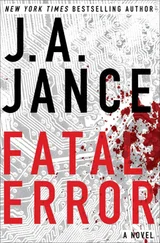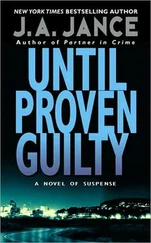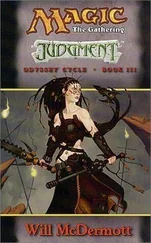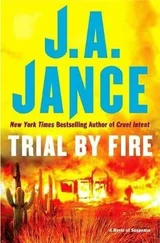Guilty as charged, and that was pretty much the end of Joanna’s taking issue with the rodeo queen situation.
“Hey,” Joanna said as Jenny dropped her backpack on the floorboard, scrambled into the passenger seat, and fastened her seat belt. “How are things?”
“Good,” Jenny said.
“And work?”
“Okay.”
The older Jenny got the harder it became to get her to reply to any given question with something other than a single word.
“School?” Joanna ventured.
“School was weird.”
That was more than a one-word answer. It was long on worrisome implications but short on meaning. “What do you mean, weird?”
“When the buses were leaving this afternoon, the parking lot was full of cops.”
“Really?” Joanna asked. “How come? Did something happen? Was the school on lockdown?”
And if it was, she asked herself, why didn’t I know about it?
“Ms. Highsmith is missing or something.”
Debra Highsmith, the high school principal, was someone with whom Joanna had crossed swords several times, most notably when Joanna had been invited to speak at career day and was notified that, due to the school’s strict “zero tolerance of weapons” policy, she would need to leave both her Glock and her Taser at home. Joanna had gone to the school board and had succeeded in obtaining a waiver of that policy for trained police officers.
“Ms. Highsmith is missing?” Joanna asked.
Jenny shrugged and nodded. “She wasn’t at school this morning. When I took the homeroom attendance sheets down to the office, I heard Mrs. Holder talking to Mr. Howard about it—that Ms. Highsmith hadn’t come in and that it was odd that she hadn’t called to let anyone know. After that, I didn’t hear anything else until we were going out to the buses. That’s when all the cop cars showed up.”
Wondering what had happened but not wanting to grill her daughter, Joanna changed the subject. “How was driver’s ed?”
“Mr. Forte is having a hard time finding a stick-shift vehicle for me to practice on.”
Jenny had won her local rodeo crown, but there were other titles to conquer. If she intended to run for or win any of those, both Jenny and her horse, Kiddo, needed to attend the far-flung competitions, a reality which had underscored the fact that they needed suitable horse-hauling transportation.
With that in mind, Butch had gone on Craigslist and found a bargain-basement used dual-cab Toyota Tundra pickup complete with a heavy-duty towing package. It was a good enough deal that he had snapped it up on the spot. The only sticking point had to do with the fact that the Tundra came with a manual transmission, and all the vehicles used for Bisbee High School’s driver’s ed classes were automatics.
“If Butch finishes going over his copyediting, maybe he can take you out for a spin tomorrow since you don’t have school.”
“I’m working tomorrow,” Jenny said. “We’re planning to do the driving thing on Saturday.”
Faced with severe budget shortfalls, the school district had switched to four-day weeks, leaving the schools shuttered on Fridays and weekends. It cut down on utilities and transportation costs, but it left working parents scrambling for something to do with their kids each Friday when school was out and the parents still had to work. Joanna was fortunate. On those days when extra kids had to be accommodated at the church-run preschool and day care, Dennis was usually able to be at home with Butch. When Butch wasn’t available, they could call on Carol Sunderson, their part-time housekeeper, and her two grandsons.
Joanna pulled over to the curb, and Jenny dashed inside to get her brother. While she was gone, Joanna called Alvin Bernard, Bisbee’s chief of police. She was still on hold when Jenny came out with Dennis in tow. As Jenny strapped her little brother into the car seat that was a permanent fixture in Joanna’s patrol car, Alvin finally came on the line.
“Sorry to make you wait so long,” Alvin said. “I’m busier than a one-legged man at a butt-kicking contest.”
Like Arlee Jones, Alvin Bernard was a good old boy of a certain vintage. When Joanna was first elected sheriff, Alvin hadn’t exactly welcomed her to the local law enforcement community with open arms. Over time, however, they had buried the hatchet and learned to work together.
“What’s the deal with Debra Highsmith?” Joanna asked.
“Sorry, I suppose I should have given you a call about this,” Alvin said, “but it’s been crazy. When she didn’t show up at school this morning and didn’t call in, we sent out officers to do a welfare check. They found nothing—zip. Her purse was there, but her cell phone, car keys, and car are missing. And there’s a pair of shoes on the floor beside the door, as though she kicked them off as soon as she came inside. There was no sign of forced entry. No sign of a struggle. It’s as though she went home after school yesterday afternoon and then both she and her vehicle simply vanished into thin air. We’ve checked with all the neighbors. No one admits to having seen or heard anything out of the ordinary with her or with her dog.”
“She’s got a dog?” Joanna asked.
“A big Doberman,” Alvin replied. “The neighbors tell us she’s only had him a couple of weeks, but he’s gone, too. Dog dishes and doggy doo-doo are everywhere. No dog, but with the car and keys gone, it’s unlikely that the woman’s on foot, and chances are the dog is with her. All the same, we’re searching the neighborhood in case she went out for a walk with the dog. It could be she suffered some kind of medical emergency and ended up in a ditch where no one can see her. Or else she’s in a hospital. I’ve got someone calling hospitals in the area just in case.”
“Where does she live?”
“Out in San Jose Estates, so there’s some distance between the houses. I’ve had uniforms out canvassing up and down the street. No one remembers seeing her out and about on foot or otherwise. However, we did find something pretty interesting.”
By then Joanna had put the Yukon in gear and was driving down Tombstone Canyon with Dennis jabbering happily in the backseat. His brand of nonstop talk was pretty much lost on everyone but his sister, who seemed to understand his every word. Neither of them appeared to be paying the slightest attention to Joanna’s side of the conversation.
“What’s that?”
“Remember when she gave you all that crap over her zero tolerance of weapons at school?”
“Yes,” Joanna said. “I remember it well. Why?”
“I knew she had applied for and received a concealed-weapons permit. After her giving you so much grief about bringing a weapon to school, I guess I never thought she’d go the distance, but she did. Guess what we found in her purse? One of those two-inch Judge Public Defenders loaded with five four-ten shotgun shells.”
A Public Defender loaded with shotgun shells certainly wouldn’t have been Joanna’s first choice of weapon. It was designed to do serious damage, and it wasn’t something that lent itself to harmless practice shooting on a firing range.
“You’ve got to be kidding. She had one of those in her purse?”
“Yes, ma’am,” Alvin said. “Big as life. Considering her very public attitude toward firearms, I thought you’d get a kick out of that.”
As far as Joanna was concerned, “kick” wasn’t exactly the word that came to mind.
“Sounds like she was worried about something,” Joanna said. “You don’t go around with a handgun in your purse, especially one loaded with shotgun shells, if you haven’t a care in the world.”
“Who has a gun in her purse?” Jenny asked.
If Jenny was tuning in, that meant that Joanna’s part of the conversation was over. “Keep me posted if you learn anything more,” she said. “I need to get my kids home to dinner.”
Читать дальше












